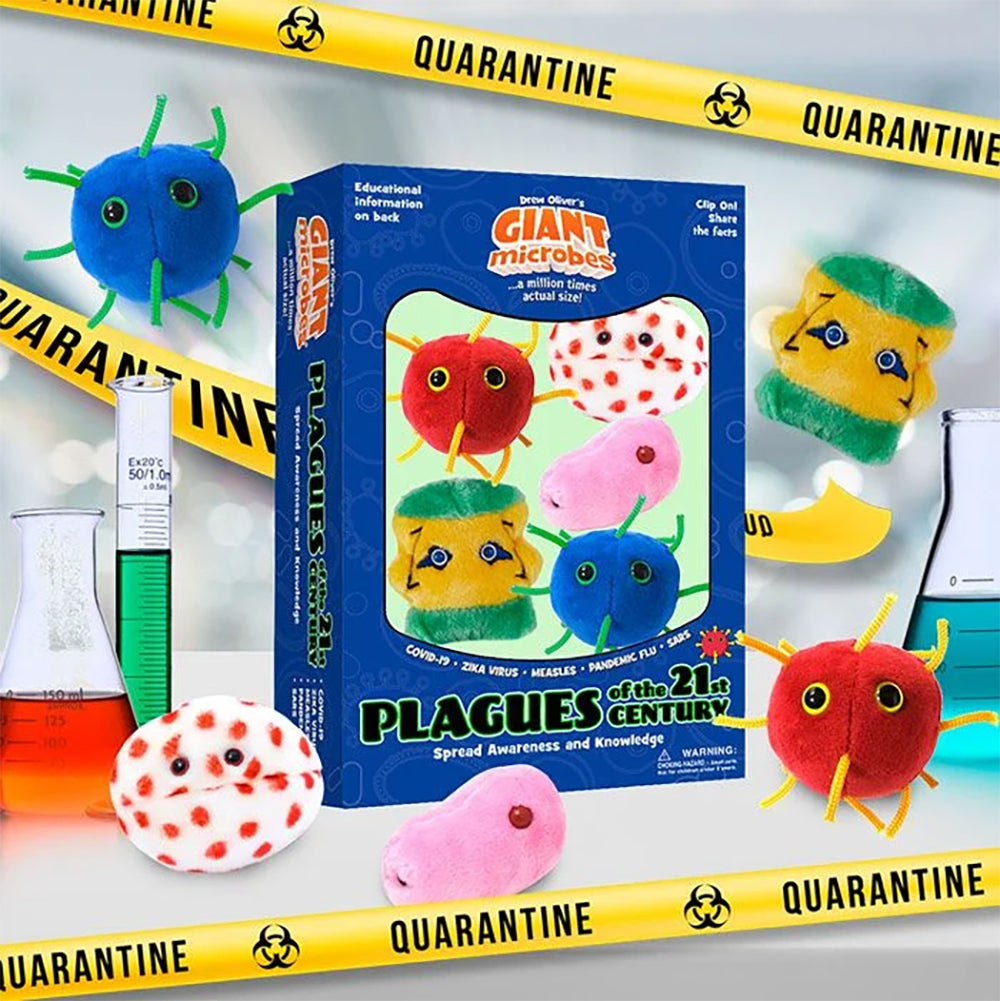You will not be allowed to compare more than 4 products at a time
View compareGIANTmicrobes Plush - Plagues Of The 21st Century
GIANTmicrobes Plush - Plagues Of The 21st Century
5.0 / 5.0
(1) 1 total reviews
Hurry! Only left 8 in stock
Share
Couldn't load pickup availability
Estimated delivery: 12-26 days (International), 3-6 days (United States).
Return are within 30 days of purchase. No free shipping or returns.
Guarantee safe and secure checkout
Description
Description
GIANTmicrobes Plush - Plagues Of The 21st Century
These Giant Microbes Dolls are a Million times their Actual Size! GIANT microbes are health and science products for humorous, educational, collectible, and Smart fun! Products include printed cards with fun fascinating facts. Unique gifts for students, scientists, teachers, health professionals & anyone with a healthy sense of humor!
All About the Plagues of the 21st CenturyThis pack of nasty microbes that have wreaked havoc in recent times will help you spread the facts and give you some perspective. Spread awareness and knowledge of these deadly, modern plagues.
Clip them onto your backpack, keys, or anywhere! Includes key chain clips.
Educational map of Microbes of the World and infographic on Hand Washing best practices included.
Plagues of the 21st Century themed gift box includes:
COVID-19 - Cities are locked down and economies quiver. The coronavirus disease COVID-19 arrived in 2019 and quickly spread globally along with confusion, rumors, and fear. Scientists investigate vaccines as nations “go medieval” by quarantining citizens. When a mysterious microbe comes knocking and the threat of a pandemic is in the air, stay calm and learn the facts.
COVID-19 is respiratory, spreading mainly in coughs and sneezes. Compared to the flu, it may be more contagious and deadly. Symptoms can include fever, cough, and shortness of breath. To prevent illness avoid contact with sick people, wash your hands, and do not panic.
ZIKA - The Zika virus causes devastating birth defects and neurological disorders. It is transmitted to people by the bites of infected Aedes mosquitoes, which live in the Americas, Africa, and Asia. Most infected people have no symptoms, while some have a fever, rash, and muscle pain.
Zika became a public health emergency in 2016 when it emerged in Brazil and spread globally. Increases in human population and travel combined with climate change have helped this disease spread. There are still no treatments or vaccines available. Zika has not vanished so do your best to avoid this mosquito. The larger lesson is that we have to prepare for the emergence of new menacing microbes.
MEASLES - Measles is a highly contagious virus that remains a dangerous health threat. Many people catch this microbe each year despite a vaccine that's spot-on. Although its telltale symptoms are red spots and a mild fever, it is in fact a respiratory disease that can lead to fatal pneumonia and brain damage.
The good news is that most children are inoculated against measles, typically along with mumps, rubella, and chickenpox when they receive their MMRV shot. The bad news is that cases have recently skyrocketed. Measles is one of the leading causes of vaccine-preventable childhood deaths, yet weak healthcare in developing countries and misinformed vaccine resistance have led to its resurgence. Vaccinations can stop this modern-day plague.
PANDEMIC FLU - The flu, or influenza, is capable of killing rapidly and efficiently, more so than any other known virus. The seasonal flu sickens millions annually. But new flus can lead to global pandemics. All flus originate in wild ducks, gulls, and other water birds. When certain strains spill over to infect mammals, deadly hybrid flus can emerge.
Swine flu, the H1N1 strain, is a mix of pig, bird, and human flu viruses. H1N1 caused the last four flu pandemics including the 1918 Spanish Flu, nightmarishly fatal to over 50 million people who had no immunities against that unfamiliar strain. The flu is full of surprises, so we best pay attention and prepare.
SARS - Years before COVID-19 arose to plague our world, the first coronavirus to inflict serious illness upon people was SARS, severe acute respiratory syndrome. In 2003, SARS jumped from its animal host to humans. From China it spread to 32 countries, infecting over 8,000 people with respiratory disease and killing 774.
The SARS epidemic was deadly but it did not rise to the level of a pandemic. Scientists were quick to identify this novel virus and health experts were efficient in isolating cases. Humanity was also lucky. That coronavirus vanished and was nearly forgotten, that is until its cousin COVID-19 emerged in a much bigger way.
Reviews
Reviews
So good












